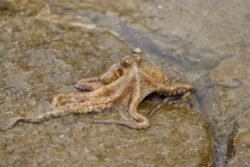
Octopuses have long captivated the imagination of scientists and nature enthusiasts alike. With their unique appearance, intelligence, and remarkable abilities, these creatures have become the subject of many scientific studies. While octopuses are primarily known for their affinity for water, recent research has shed light on their surprising potential to survive on land.
The Octopus: A Master of Adaptation
Octopuses belong to the cephalopod family, which also includes squids and cuttlefish. These incredible creatures have evolved over millions of years, developing a range of adaptations that have allowed them to thrive in various environments. From their ability to change color and shape to their highly developed problem-solving skills, octopuses are truly remarkable.
Exploring Terrestrial Abilities
While octopuses are primarily aquatic creatures, they have been observed displaying some fascinating terrestrial behaviors. In fact, there have been several documented instances of octopuses voluntarily leaving the water and venturing onto land. These events have sparked great interest among scientists and have led to further investigation into the octopus’s ability to survive outside of its natural habitat.
One of the most notable examples of octopuses’ terrestrial capabilities is the common octopus (Octopus vulgaris). In laboratory settings, these octopuses have been observed leaving their tanks and crawling across dry surfaces to reach other containers of water. This behavior suggests that octopuses have the physical capacity to move on land, albeit for short distances.
The Science Behind Octopuses on Land
The ability of octopuses to survive on land is attributed to their unique respiratory system. Unlike fish, which extract oxygen from water using gills, octopuses have gills as well as the ability to breathe air. This dual respiratory system allows them to extract oxygen from both water and air, enabling them to survive in environments with low oxygen levels.
Another crucial factor that influences octopuses’ ability to survive on land is their skin. Octopuses have a remarkable ability to change the color, pattern, and texture of their skin, which helps them camouflage and adapt to their surroundings. This adaptive camouflage is particularly useful when venturing onto land, as it allows octopuses to blend in with their surroundings and avoid potential predators.
Limitations and Challenges
While octopuses have shown some impressive terrestrial capabilities, it is important to note that their survival on land is limited. Octopuses are highly adapted to the aquatic environment, and their physiology is optimized for life in water. The lack of a supportive skeletal structure and the absence of a protective layer to prevent drying out pose significant challenges for octopuses on land.
Additionally, octopuses rely on their surroundings for temperature and humidity regulation. The dry and fluctuating conditions on land can be detrimental to their health and overall well-being. Without a constant supply of water to keep their gills moist, octopuses may experience difficulties in extracting oxygen, leading to respiratory problems.
Conclusion
The terrestrial capabilities of octopuses are undeniably fascinating. While they have demonstrated the ability to survive on land for short periods, their physiology and adaptations are primarily suited for the aquatic environment. Octopuses continue to amaze scientists with their intelligence, problem-solving skills, and unique characteristics. Further research into their terrestrial abilities may provide valuable insights into the evolution and adaptability of these incredible creatures.

1 comment on Can an Octopus Live on Land?: Exploring Their Terrestrial Abilities